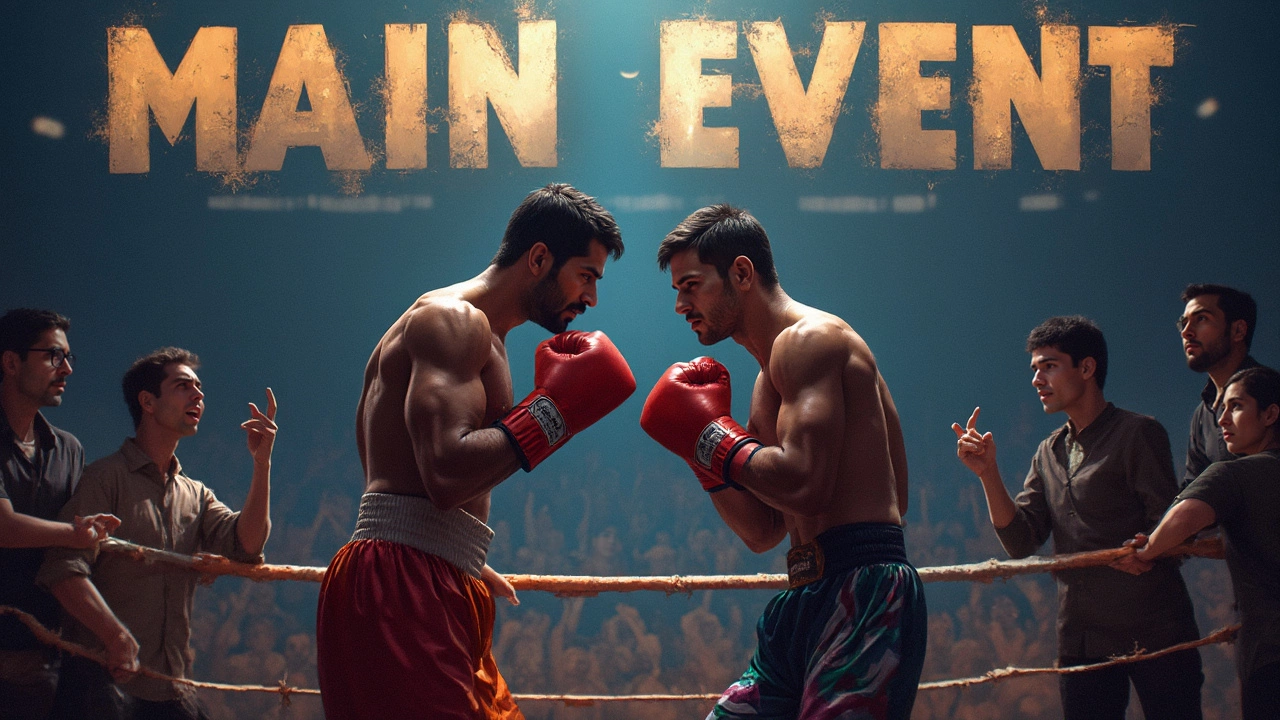If you’ve ever tuned in to a big boxing night and heard words flying that make no sense, you’re not the only one. A lot of people talk about 'the bout', 'the scrap', 'throwdown', 'fight night', or even ‘slobberknocker’ when they really just mean a boxing match. There’s a good chance you’ve heard these in movies too—sometimes even from that one friend who pretends he knows every boxer in history.
So what’s the go-to slang? 'Scrap' and 'throwdown' grab headlines for their no-nonsense punch. 'Main event' is what you call the top fight on a card, while a smaller undercard fight might be just ‘a dust-up’. You’ll also hear commentators say, 'These two are about to go toe-to-toe,' or they’ll hype 'the showdown.' Every phrase brings a little flavor to the action. If you walk into a sports bar in Mumbai or New York, drop 'Who's headlining the card tonight?' and you’ll instantly sound like you get it.
But slang isn’t just about fitting in. It’s a big part of enjoying the sport, connecting with other fans, and feeling the hype when you talk about fights on social media or at home with friends. Ever wondered why some phrases catch on while others never stick? There’s actually a story behind how the lingo came to be, and it’s not as random as it sounds.
- The Most Popular Slang Terms
- How the Slang Developed
- Insider Tips for Speaking Like a Pro
- Slang in Commentaries and Social Media
The Most Popular Slang Terms
If you want to talk like someone who's been ringside forever, you need to know the most popular boxing match slang. Some of this lingo is everywhere, from TV commentary to what fans shout at the screen. Let's break down what you'll hear most often.
- Scrap: This one's simple—a 'scrap' just means a fight. It's used casually, like 'Did you catch the scrap last weekend?'
- Bout: This word pops up in every official setting. A 'bout' is any match, big or small. Promoters and commentators stick with it, so you'll sound in-the-know if you use it.
- Main Event: The headlining fight of the night, usually the reason everyone tunes in or buys tickets. Fans ask, 'Who's in the main event tonight?'
- Undercard: Fights that take place before the main event. Sometimes these are called 'prelims', and they feature up-and-coming fighters or tough veterans making a comeback.
- Throwdown: This is another way to hype up a match, especially if it's expected to be aggressive or wild.
- Slugfest: When two fighters go all out, exchanging tons of punches, fans call it a slugfest. It’s a compliment, not an insult.
- Decision: Not exactly slang, but when a fight goes the distance and the judges have to pick a winner, you'll hear 'This one’s going to a decision.'
TV commentators love to spice up their talk. Don’t be surprised to hear ‘toe-to-toe’ when both fighters are glued to the center of the ring. If a fight gets messy, someone might call it a ‘donnybrook’—that’s old-school, but still turns up at times.
Different countries sometimes add their spin. In the UK, calling a fight a ‘dust-up’ or ‘barnburner’ is totally normal. These words keep the sport’s language fresh and fun.
Fun fact: According to DAZN's 2023 broadcast stats, phrases like "main event" and "slugfest" were used at least five times during big nights like Canelo vs. Charlo. That’s proof these terms aren’t just extras—they’re how people actually talk about the action.
How the Slang Developed
The world of boxing match slang didn’t pop up overnight. A lot of the lingo comes straight from the streets, gyms, and early promoters. In the 1800s, boxing was more underground than mainstream, so fans, trainers, and fighters used code words so cops wouldn’t catch on. Words like 'scrap' or 'dust-up' felt casual and kept things on the down low.
When boxing got legal and big money got involved, the sport still kept old words but added new ones thanks to entertainment and TV. Promoters started hyping fights as 'the main event' to pull in bigger crowds. Announcers wanted catchy ways to keep people glued to their TVs so they used cool phrases like 'slugfest' or 'no holds barred.' They knew if the language sounded exciting, more folks would tune in.
TV commentators, especially in the US and UK, played a huge part in spreading boxing slang. When the legendary Howard Cosell called a fight a 'slugfest,' millions copied it. Promoters like Don King loved dramatic terms like 'Rumble in the Jungle' to make bouts stand out. Social media added fuel to the fire, with hashtags like #FightNight and #BattleRoyale popping up every time a big boxing match hit the headlines.
Today, boxing slang isn’t just about the ring. You’ll hear it in online chats, on fan forums, and in almost any city with a boxing gym. Some gyms even have their own spins on old favorites. Check out how some popular terms made their way into everyday talk:
- Bout: Formal word used by old-time announcers, now part of normal fight talk.
- Main event: Adopted from big wrestling and boxing cards in the 1970s.
- Scrap: Based on street slang, first used in New York and London gyms.
- Toe-to-toe: Used by ringside reporters since the mid-1900s to describe two fighters trading punches up close.

Insider Tips for Speaking Like a Pro
If you really want to sound like you belong ringside, you can’t just throw around words like 'boxing match slang' or the odd 'main event.' Pro fans and actual boxers use these terms in very specific ways, and there are a few tricks that make your talk way more legit.
- Instead of saying “round,” try calling it a “frame” or “stanza.” Some old-school fans will nod in approval. For example: 'He took control in the fourth frame.'
- Say “scorecards” when you talk about the judges’ decisions. If it’s a close fight, people might mention that 'this one’s going to the cards.'
- Use 'split decision,' 'unanimous decision,' or just 'UD' (for unanimous decision) when someone asks how a fight ended. People will catch that you know how fights get decided outside of a knockout.
- If two fighters are trading blows, call it 'trading leather' or say 'these guys are in a real barnburner.' It’s way more fun and totally normal in fight night lingo.
- The big favorites are 'A-sides' and the lesser-known fighters on the card are 'B-sides.' It’s not just for mix tapes; it’s standard in boxing terms.
Here’s a quick breakdown of popular phrases and what they mean, so you don’t get caught out:
| Slang Term | Meaning |
|---|---|
| The Sweet Science | Refers to boxing as a skilled sport, not just a brawl |
| Chin | A fighter’s ability to take punches without going down |
| Glass jaw | Someone who gets knocked out easily |
| Pound-for-pound | Ranking system across weight classes |
| Tale of the tape | The stats and measurements of fighters before a match |
Want to blend in on social media or at a watch party? Toss out a phrase like, 'This is a classic toe-to-toe scrap,' or 'I think it’ll go the distance.' Someone who hears you say 'Going the distance' will know you’re talking about a fight that lasts all scheduled rounds—not just a random guess.
And if you ever get lost in a conversation, just listen, pick up a couple of the terms, and throw one back when you can. That’s how even the pros picked things up when they started.
Slang in Commentaries and Social Media
Flip on any big boxing match, and you'll catch commentators throwing around slang like it’s second nature. These guys don’t just use terms like “scrap” or “toe-to-toe” to sound cool—they’re painting a picture for the audience. If you listen, you’ll hear stuff like “He’s looking for the KO,” meaning knockout, or “They’re trading leather,” which simply means both fighters are landing punches. They might hype things up by calling the fight a “slugfest” if it looks like a brawl, or say “he’s on the ropes” when a boxer is stuck on defense.
Even the term fight night lingo wouldn’t be complete without talk of the “undercard” (the smaller fights before the main event) and “headliner” (the star bout). You’ll catch phrases like “scorecards” when it goes the distance and judges decide the winner, or “split decision” if it’s not a unanimous call. All this slang keeps things lively and helps fans follow the action even if they’re new to the sport.
Hop on social media when a boxing match is trending, and you’ll see the same language in memes and tweets—sometimes even new rhymes and funny nicknames for fighters. Read through Reddit after a major fight, and everyone’s debating who “got robbed” (lost unfairly), or who “owned the ring.” On TikTok, you’ll hear people say “Did you catch that uppercut in the scrap last night?” It’s actually helped keep classic phrases alive, and new ones pop up every big fight.
| Slang Term | What It Means | Where You’ll Hear It |
|---|---|---|
| Scrap | A fight, often a heated one | Commentators, social media |
| Main event | The headline boxing match | Fight night promos, tweets |
| Undercard | Preliminary matches before the big fight | Broadcasts, news posts |
| Slugfest | A fight with tons of heavy blows | Live commentary, highlight reels |
| Robbed | Feeling a boxer lost unfairly | Fan debates, Reddit threads |
If you get the hang of these terms, you won’t just follow the action—you’ll join in on the banter. The more you watch and chat online, the more this unique boxing terms slang becomes second nature. It might even get to the point where you’re teaching your friends the difference between a “dust-up” and a “throwdown.”




